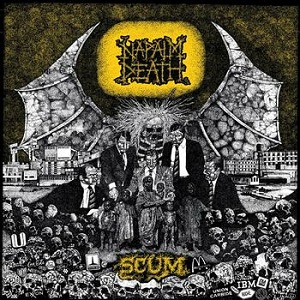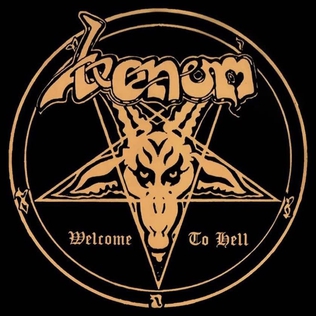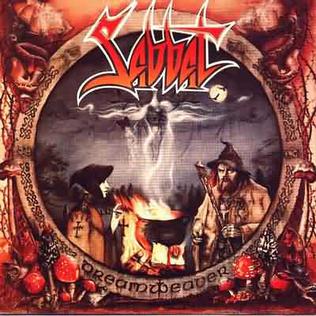
Scum is the debut studio album by English grindcore band Napalm Death, released on 1 July 1987 by Earache Records. The two sides of the record were recorded by two different lineups in sessions separated by about a year; the only musician in both incarnations was drummer Mick Harris. The two sides are very different, and the two taken together serve to bridge stylistic elements of heavy metal and punk rock. While the songs on the A-side are influenced heavily by hardcore punk and anarcho-punk, the vocals and lower-tuned electric guitars on the B-side anticipate subsequent developments in extreme metal. Loudwire put it in the list of the best 10 metal albums of 1987.

Skyclad are a British heavy metal band with heavy folk influences in their music. They are considered one of the pioneers of folk metal. The etymology behind the term "skyclad" comes from a pagan/wiccan term for ritual nudity, in which rituals are performed with the participants metaphorically clad only by the sky, as a sign of equality. The name alludes both to the band's religious leanings and to their social beliefs, as set out in the song "Skyclad" on their first album.
Martin Walkyier is an English singer, known for his participation in the heavy metal bands Sabbat and Skyclad. The late Metal Hammer journalist Detlef Dengler called Walkyier a "great lyricist" known for his multitude of words and "brilliant puns". Author Paul Stenning has referred to Walkyier as a "lyrical genius".

Steve Ramsey is a British guitarist who began his career with the heavy metal band Satan in the early 1980s, releasing a single and an album, a second album under the band name Blind Fury, an EP and another album after changing the band name back to Satan and two more albums after renaming the band name once again, to Pariah.

Pungent Stench is a death metal band from Vienna, Austria, formed in 1988. Their last known lineup consists of Martin Schirenc (vocals/guitar), Danny Vacuum (vocals/bass), and Mike G. Mayhem (drums). Pungent Stench achieved early on prominence in the death metal scene due to their unique style of extreme metal and their controversial lyrical content, a seamless blend of gore, paraphilia and black comedy. They dissolved in 1995, re-formed in 1999, then split up again 2007 after recording a final studio album, eventually released in 2018, and re-formed again in 2013 as “The Church Of Pungent Stench” and renamed themselves again as “Schirenc Plays Pungent Stench” in 2014”

A demo is a song or group of songs typically recorded for limited circulation or for reference use, rather than for general public release. A demo is a way for a musician to approximate their ideas in a fixed format, such as cassette tape, compact disc, or digital audio files, and to thereby pass along those ideas to record labels, producers, or other artists.

Sabbat is a Japanese black metal band formed in the early 1980s. On some releases, they showcase a more thrash- and heavy metal-influenced sound.

Sabbat were an English thrash metal band from Nottingham consisting of Martin Walkyier (vocals), Andy Sneap (guitars), Simon Jones (guitars), Frazer Craske (bass) and Simon Negus (drums). They are considered one of the "big four" of British thrash metal along with Acid Reign, Onslaught, and Xentrix, who were all responsible for developing and popularizing the country's thrash metal scene in the late 1980s and early 1990s. Over their initial six-year run Sabbat released three studio albums, four demos, two split singles/compilation albums, two singles and a live VHS. In 1988 the band released their debut album History of a Time to Come which earned them further recognition. Their next album, Dreamweaver (1989), was also critically acclaimed. Shortly after the release of Mourning Has Broken (1991), tensions with the band began to surface, most of them revolved around money and Sabbat disbanded as a result. After an attempted reunion in 2001 which was blocked by Sneap, the original Sabbat lineup reunited in 2006. In December of that year they performed together for the first time in sixteen years at five different venues in England. One was a warm-up gig in Nottingham, the other four in support of Cradle of Filth. The band has continued to perform live around the world but has not released any new material. In a January 2014 interview with Decibel magazine Andy Sneap confirmed that Sabbat had once again split-up.

Tape Head is the seventh studio album by American rock band King's X, released in 1998 via Metal Blade Records.

Welcome to Hell is the debut studio album by English heavy metal band Venom. It was released in December 1981 through Neat Records at the culmination of the new wave of British heavy metal movement. The album was re-released by Sanctuary Records in 2002.
Unseen Terror was a British extreme metal band formed by Mitch Dickinson (Heresy) and Shane Embury, and played extreme metal with a technical edge along with elements of hardcore punk. Their most notable feat took place in March 1988, when they recorded tracks for John Peel's BBC Radio 1 program.
Asgeir Mickelson is a Norwegian musician, artist, photographer and music reviewer. Although primarily known as a drummer, he is also a skilled guitarist and bassist.
Yyrkoon is a French death metal band. The main lyrical themes revolve around occultism, horror/fantasy, and members' personal philosophies. The name Yyrkoon is derived from the name of Elric of Melniboné's cousin in Michael Moorcock's fantasy series.

Dreamweaver (Reflections of Our Yesterdays) is the second full-length album by the British thrash metal band Sabbat, released in 1989

Root is a Czech black metal band.

Mourning Has Broken is the third and final full-length album by the British thrash metal band, Sabbat, and the band's only album following the departure of singer and lyricist Martin Walkyier. The album is generally considered both a critical and commercial failure and the band split up soon after its release.
Satan are an English heavy metal band originating from Newcastle upon Tyne in 1979, known as part of the new wave of British heavy metal movement. The band is considered influential for playing a form of proto-thrash/speed metal that was fairly advanced by the standards of the early 1980s.

Hell are an English heavy metal band from Derbyshire, formed in 1982 from the remaining members of bands Race Against Time and Paralex. Due to a series of unfortunate and tragic events, the band originally folded in 1987. They were amongst the first bands to wear proto-corpse paint as part of their stage show, which featured hysterical ranting from a gargoyle-adorned pulpit, along with the use of a pyrotechnic exploding Bible which caused outrage amongst the clergy when it originally appeared in 1983.

Andy Sneap is an English guitarist, record producer and composer with over 100 albums to his name, most of which have been produced at his Backstage Recording studios in rural Derbyshire. Some of the most critically acclaimed production work on albums include Deliverance by Opeth and Disarm the Descent by Killswitch Engage; for which he earned a Swedish Grammis and a US Grammy nomination, respectively. As a performer, he first built his reputation as one of the guitarists in the British thrash metal band Sabbat, and played with them up until their disbanding. He is currently one of the co-guitarists of the British heavy metal band Hell. In 2018, Sneap joined Judas Priest as a touring guitarist, following long-time lead guitarist Glenn Tipton's diagnosis of Parkinson's disease which conflicts with his touring abilities, and while not an official member of the band, he contributed guitar work to their upcoming nineteenth studio album Invincible Shield (2024).














